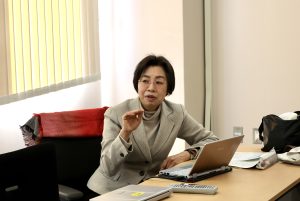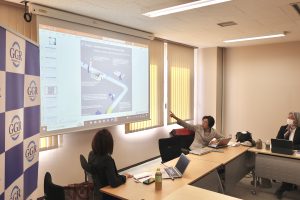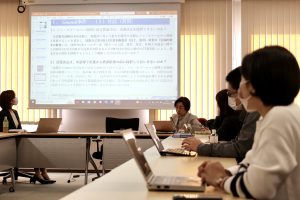On January 26, 2023, the Institute for Global Governance Research (GGR) hosted its 11th GGR Brown Bag Lunch Seminar on “Rights of refugees and migrants? Asylum Seekers’ Right to Effective Judicial Protection under EU Law: The Gnandi Case of the European Court of Justice as a Turning Point” with Dr. Ikuko Sato, a professor at J. F. Oberlin University and a visiting researcher at the Graduate School of Law, Hitotsubashi University.
Professor Sato examined the issue of whether refugees and migrants are also entitled to effective judicial protection as guaranteed by EU law, taking up the Gnandi case (C-181/16 [GC]) before the Court of Justice of the European Union (CJEU). The case concerns an appeal against the rejection of an application for international protection and a removal order. Professor Sato explained that an appeal against a return decision, unlike a legal review or an appeal against rejection of an application for asylum, may lead to a violation of the non-refoulement principle arising from the legal effect of the return decision. Therefore, the Court clarified that said appeal should have an automatic suspensive effect to prevent the implementation of the return proceedings so as to ensure the right to an effective remedy equivalent to Article 47 of the EU Charter of Fundamental Rights. Professor Sato also pointed out that the preliminary ruling mentioned above is reflected in the proposed recast to the Asylum Procedures Directive and the Return Directive (under consideration) and in subsequent case laws, and concluded that the guarantee of judicial review for violations of individual rights under the EU Charter of Fundamental Rights could be interpreted as also extending to the immigration area as “the right to effective judicial protection” for refugees and immigrants. On the other hand, Professor Sato noted the lack of clarity in the criteria and procedures for humanitarian grounds, and the possibility of excluding access to such right at the border through the proposed new measures, e.g., a set of expedited procedures linking asylum and return and strengthening cooperation on return and readmission with third countries in response to comprehensive institutional reform under the 2020 “New Agreement on Migration and Asylum.”
During the Q&A session, about 11 participants including professors and students asked questions and commented on the EU’s response to draft evaders from Russia and refugees due to climate change; providing information and assistance to asylum seekers on accommodations and asylum application procedures in Belgium; the possibility of extending EU asylum laws and systems to the Asian region; and differences in refugee recognition rates among EU member States, among other issues.



